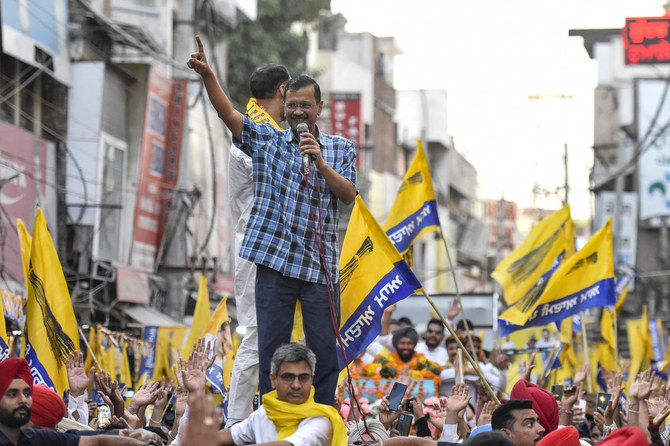NEW DELHI: Indian Prime Minister Narendra Modi is poised to return for a rare third five-year term as the country’s premier, according to exit polls that have projected a clear victory for the alliance led by his Bharatiya Janata Party.
Major exit polls conducted by Indian TV stations and agencies showed the ruling National Democratic Alliance, or NDA, winning a two-thirds majority in the 543-member lower house of parliament, where 272 is needed for a simple majority.
The polls, published on Saturday evening ahead of official results due on June 4, would mean that the NDA would easily beat the opposition INDIA alliance, a coalition of parties led by the formerly ruling Indian National Congress, and leave Modi with a strong mandate to form the next government.
“I can say with confidence that the people of India have voted in record numbers to reelect the NDA government,” Modi wrote on X, without providing evidence of his claim.
“The opportunistic INDI Alliance failed to strike a chord with the voters. They are casteist, communal and corrupt. This alliance, aimed to protect a handful of dynasties, failed to present a futuristic vision for the nation.”
The exit polls predicted the BJP and its allies winning 350 to 380 seats, making these projections likely higher compared to when the NDA won 352 lower house seats in the 2019 general elections, with the BJP accounting for 303 of them.
The opposition, meanwhile, was projected to win between 125 and 182 seats.
The early unofficial results were the first indications of the shape of India’s next government. They were released after a ban on the publication of opinion polls imposed at the start of the polls was lifted on Saturday evening, following the end of the final round of voting in the seven-phase election, in which more than 968 million people were registered to vote.
The opposition dismissed the exit polls and ahead of their publication had called them “prefixed.”
“It is a fantasy poll and a Modi poll. It is not an exit poll, it is a Modi media poll. It is his fantasy poll,” Congress leader Rahul Gandhi told the media on Sunday.
As India’s exit polls have had a mixed record on predicting elections in the past, political analysts are also doubting their accuracy.
“It does not reflect the ground reality and most of the exit polls are erroneous and contradictory,” Umakant Lakhera, Delhi-based political analyst, told Arab News.
“The reliable ground reports from some of the major states like West Bengal and Uttar Pradesh suggest that the opposition alliance is doing quite good and gaining major seats.”
Satish K. Singh, former consulting editor of Delhi-based Hindi channel Zee News and political analyst, said the exit polls were not trustworthy.
“I don’t trust exit polls at all. This is the tool of propaganda. This is done with a view to creating a certain kind of opinion; it is also fixed and stage managed,” Singh said.
“I don’t think the BJP will be getting as many seats as the exit polls are predicting. The BJP might have an edge, it has an advantage, but the contest is close if the voting and counting process are transparent.”
If the official results back up the exit polls, Modi’s BJP victory will come unscathed by issues of inflation, unemployment and rising inequality, which were among the main concerns of Indian voters prior to the election, surveys revealed.
“If the BJP manages to win despite all the pressing issues facing the country, the credit would go to the captive media, non-stop propaganda and the open practice of majoritarian politics,” Singh said.
“The opposition could not invade this ecosystem.”



















